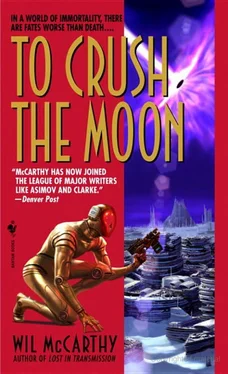But the sky here was as blue as the grass was green, with the yellow-white sun shining brightly through an arch of puffy cumulus clouds. Did the soul ever forget this stuff? Did the body, independent of the intellect, feel the allure of its natural home?
“Oh my,” said Conrad, his eyes agog, his heart aflutter.
And almost as quickly, with his first few steps, he felt a sort of brightness in his own body as well. His flesh had been optimized by the best morbidity filters the Barnard colony could devise, and Barnard was (or rather, had been) the clear leader in that field. He was very difficult to injure—on Newhope it had taken a propylene glycol explosion, the boiling liquid jetting out so hard it had smashed him right through a wellmetal railing. And he’d survived even that, long enough to get down to the cryo tubes.
And for the same reasons, his body aged slowly. In the colony’s waning days, when Conrad and Xmary had stolen Newhope and spirited away the frozen dead, Barnard’s elite classes had spoken half-seriously about outliving the coming dark age. Hoarding the last of the medical-grade faxes, they planned across the millennia while the proletariat lived and died around them. According to some of the models, a single optimization might carry a careful person through a thousand years of life. Or more. Ah, but Conrad and his fellow traitors had been so long on that ship, that damned, cramped tower of a ship. With limited exercise, limited stimulation, an industrial-grade diet of recycled organics and minerals. Ordinary human beings would surely have cracked under the strain. They were a hundred and forty-six years into the voyage when disaster finally struck, and Conrad, without realizing it, had felt every day of that in his bones!
But the Frostbite Trauma Center had lifted those years away, and now that he was out in the world, in the fresh air and sunshine, he felt light as a pillow and springy as a sapling. Indeed, he’d last felt the tug of Earth at the age of twenty-five—absurdly long ago—and being back here now made him feel almost that young again.
“We’re near the ocean,” he said, for the air smelled of salt. Not the grotty acid smell of Sorrow’s lightly briny oceans, but something cleaner and heavier. Almost edible, a kind of stew. And then, feeling a slight rolling motion in the ground beneath his feet, “We’re on the ocean. A floating platform?”
Sandra nodded. “This is Sealillia , an emergency shelter owned by Red Sun Charities and deployed in times of crisis. I think the last time it was used was during the Amphitrite habitat failure on… one of Neptune’s moons. I forget which one. Twenty thousand people came streaming through these fax portals”—there were three of them here, side-by-side along one edge of the grassy field—” and stayed here five weeks.”
Ah. Interesting. “This place can hold Newhope ’s passengers, then.”
She grimaced slightly. “Well, in principle. Right now there’s a bit of a squatter problem.”
Indeed, there were two dozen people sprawled out on the grass, wrapped in blankets and apparently sleeping. This was no real surprise; open real estate with any sort of facilities access—such as the fax machines here—had attracted the indigent even on Sorrow, where indigence tended to be fatal and therefore self-limitingly rare. But as he stepped over one of the sleeping bodies, he saw a woman with painted nails and wellgold earrings, her immaculately coiffed hair only slightly smooshed by its contact with her pillow. A hobo-ish backpack lay at her feet, but she was outwardly young and certainly well dressed, in a peach-colored wellcloth pyjama adorned with moving circles of metallic gold. Her blanket was the reverse: circles of peach roaming a cloth-of-gold surface.
The others around her, men and women alike, looked comparably respectable, though they seemed inordinately fond of wellgold jewelry. And that was interesting, because the indigent people of Conrad’s time had been hairy and smelly, antisocial and unadorned, and that wasn’t the sort of fashion that ever went out of style. The ones in the old days were mostly men, too, whereas these people were about a fifty-fifty mix.
“They’re overgrown children,” he said, recognizing their type at once. Here were fully ripened citizens of, he would guess, anywhere from twenty to a hundred years of age, who could not for the life of them find the employment, the wealth, the respect accorded a true adult. And how could they, when the self-appointed adults of the Queendom refused to grow old and die? The positions of power and influence were all filled long ago, before the colonies were founded. That was why there were colonies. That was why there’d been a Children’s Revolt to inspire their hasty founding.
“Yup,” Sandra agreed. “They just show up. Tired of living with their parents and too poor to afford places of their own, they just sort of drift around the Earth like a vapor, condensing on any flat surface.”
Conrad laughed; he hadn’t realized his caseworker had a sense of humor under that bureaucratic exterior. He realized suddenly that the mere fact of her being an obstacle in his path, and a tool of the government he’d once rebelled against, did not in any way prevent her from being a likable person.
She laughed as well, but then added, “It’s only funny until the eviction crews show up. The Amphitrite evac was fifteen years ago, but Red Sun is required to maintain a state of readiness. It needs this place for the next refugee crisis, whenever that may be. Probably you guys; probably soon.”
“And the kids can’t use it in the meantime?”
“The kids have a way of messing things up, Mr. Mursk. The platform spends most of its time folded up somewhere—probably in the waters off Tonga—to prevent exactly this from happening.”
“Hmm. Well. How big is this thing?”
Instead of answering, she led him off the grassy field and out through one of several arch-shaped openings in the dome. As they approached a railing, he saw that the dome was built atop the die of a circular plinth or podium two hundred meters across, which sat in the center of a six-petaled raft of some gray, cementlike material. Covered end-to-end in black-roofed, three-story wellwood dormitories, Sealillia was a kilometer-wide flower on the surface of a featureless ocean. Around it was a low ring, projecting half a meter out of the water; the sea outside was blue and nearly waveless, but within the ring the water was distinctly greenish in hue, and teeming with laughing, splashing humans in various states of undress.
“It’s a model city,” Sandra answered finally. “Larger versions dot the equator from Galapagos to Kiribati, where hurricanes fear to tread. Probably twenty million people altogether. At the moment, I believe we’re a thousand klicks north of the Marquesas, or forty-five hundred northeast of Tonga.”
“Fascinating,” Conrad said, meaning it. Nothing of the sort had been necessary in his own time. In fact, he suspected it would’ve been illegal, as there was a push at the time to shrink the Earth’s population and expand its wilderness areas, by pushing people off into space. Apparently, this hadn’t gone well. Still, he wasn’t here to admire the scenery, or even the architecture. “Where are my friends?”
“This way,” she said, pointing, motioning for him to follow as she approached the staircase that ringed the central plinth. “They’ve got a pair of apartments in Building One.”
If that was Building One there at the foot of the stairs, then Conrad could see right away that something was going on; there were kids everywhere, but here they were clustered . Here they were all facing the same direction: toward a second-floor balcony on which three people stood. Xmary, Feck, and Eustace.
Читать дальше












